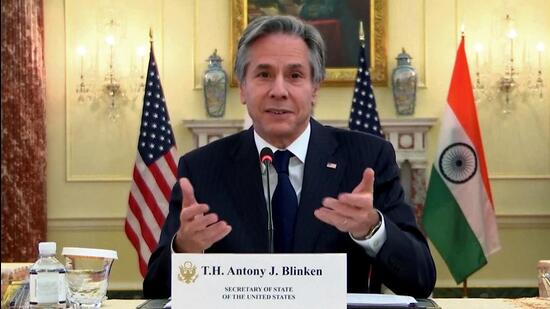US monitoring ‘concerning’ human rights abuses in India: Blinken
On Tuesday, the US State Department released a strong and critical report on human rights in India in 2021.
Juxtaposed with remarks and a joint statement where shared values and democracy were repeatedly cited as a key source of the bilateral partnership, Secretary of State Antony Blinken said that the US was monitoring concerning developments in India, “including a rise in human rights abuses” by State officials.

On Tuesday, the US State Department released a strong and critical report on human rights in India in 2021.
During his press appearance after the 2+2 dialogue — with defence minister Rajnath Singh and external affairs minister S Jaishankar standing next to him — Blinken said that India and the US share a commitment to “our democratic values, such as protecting human rights”.
“We regularly engage with our Indian partners on these shared values, and to that end we are monitoring some recent concerning developments in India, including a rise in human rights abuses by some government, police, and prison officials.”
While Washington has emphasised the need for protection of minorities and civil liberties in India, this is the first time in recent times that US has directly implicated Indian government officials in human rights abuses.
The Indian ministers did not respond on the dais.
Blinken did not elaborate, and it was not clear what specific incidents he was referring to. But on Tuesday, the State Department released its annual country reports on human rights practices for 2021.
In the executive summary, the country report on India flagged what it called credible reports of a range of human rights violations. It claimed these violations included unlawful and arbitrary killings, including extrajudicial killings by the government or its agents; arbitrary arrest and detention by government authorities; torture and inhuman treatment by police and prison officials; political prisoners or detainees; interference with privacy; restrictions on free expression and media including through violence, threat of violence, and unjustified arrests of journalists; restrictions on internet freedom; overly restrictive laws on funding, organisation and operation of civil society organisations; refouelment of refugees; government harassment of domestic and international human rights organisations; lack of investigation and accountability for gender-based violence; crimes involving violence or discrimination targeting members of minority groups, among others. The report also said that terrorists in Jammu & Kashmir, Northeastern states and Maoist-terrorism affected areas committed serious abuses.
Blinken’s remarks and the report come in the wake of a push by some progressive lawmakers in the Democratic Party, minority advocacy groups, and human rights organisations which have accused India of democratic backsliding in recent years. People familiar with the relationship said that the message appeared to be an effort to cater to a “domestic constituency” in the US.
This domestic constituency does have a voice in the Democratic-led ruling architecture in Washington at the moment — the party controls the White House as well as has a majority in both the Senate and the House of Representatives.
Last week, Congresswoman Ilhan Omar, at a congressional hearing, asked US deputy Secretary of State, Wendy Sherman, “How much does the Modi administration have to criminalise the act of being Muslim in India for us to say something? What will it take for us to outwardly criticise the action that the Modi administration is taking against its Muslim minorities?”
In February, Rashad Hussain, the US ambassador at large for international religious freedom, tweeted, in the wake of the hijab controversy in Karnataka, “Religious freedom includes the ability to choose one’s religious attire. The Indian state of Karnataka should not determine permissibility of religious clothing. Hijab bans in schools violate religious freedom and stigmatize and marginalize women and girls.”
And in January, on India’s Republic Day, four Democratic lawmakers — Sentator Ed Markey and Congressmen Andy Levin, Jamie Raskin and Jim McGovern — had flagged an erosion in Indian democracy and secularism.
But while raising concerns about rights of minorities, the administration has been careful about acknowledging the US’s own domestic democratic challenges and reiterating its support for Indian democracy. In an interview, US assistant Secretary of State for South and Central Asia, Donald Lu, told Hindustan Times in early April that India was the “most democratic place he had served”. “India certainly has areas to work on, just like all of us, but I am a firm believer in the strength of Indian democracy.”
Commenting on Blinken’s remarks, political scientist Devesh Kapur of Johns Hopkins University, who has extensively worked on India’s internal security and state capacity, said it was important to understand the larger division of power in India’s federal architecture.
“Does India have human rights issues in prison and with the police? Yes. But we should remember that police and law and order are state subjects. Are there undertrials waiting for long? Yes. But we should remember that district courts have huge pendency issues. All of this is happening largely at the state-level.”
Kapur added that the Centre’s actions haven’t helped. “There are, of course, now newer issues with central legislations which can be considered excessive, such as Unlawful Activities (Prevention) Act. We also know that there is intolerance, be it with government actions in Kashmir, or vis a vis attitude to critics. But while discussing human rights violations, it is important to keep India’s federal architecture in mind.”
Get Current Updates on India News, Lok Sabha Election 2024 live, Infosys Q4 Results Live, Elections 2024, Election 2024 Date along with Latest News and Top Headlines from India and around the world.




